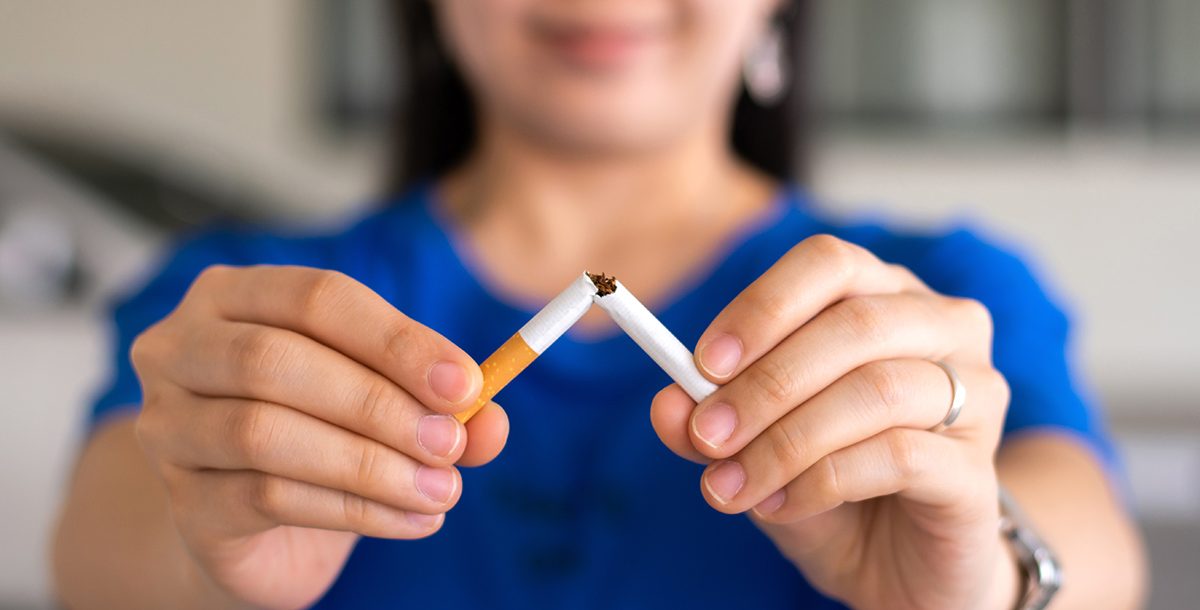Putting down the cigarettes is one of the best things you can do for your health and for your loved ones. Smoking can cause cancer, heart disease, lung disease and diabetes. When you’re ready to drop the habit, learning how to quit smoking is the first step in your new journey.
What is the best way to quit smoking?
The best way to quit smoking is the way that works for you. Some people are lucky enough to throw out their last pack of cigarettes and never pick up another. For most people, though, quitting is a process. They turn to support programs and nicotine replacement products to help them ease withdrawal symptoms. No matter which plan they choose, they go through similar steps, including:
- Deciding to quit
- Setting a quit date
- Identifying smoking triggers
- Getting rid of smoking triggers or having a plan to deal with them
- Choosing a nicotine replacement therapy, such as nicotine gum or patches
- Setting up support lines , including support groups or smoking cessation classes
So, how long does it take to quit smoking? The length of time it takes to set up a quitting plan and work through the steps varies from person to person. However, the urge to smoke does go away over time, and it gets easier as long as you stick with the plan.
How to quit smoking naturally
Quitting cold turkey or without the aid of nicotine replacement therapy (NRT) is a noble goal, but it isn’t right for everyone. Depending on how much you smoke, your body may be addicted to the drug. Nicotine patches, gum, sprays and inhalers may help you wean yourself from your nicotine addiction without shocking your system.
Pregnant women and teens should not use nicotine replacement products. You also should avoid NRT if you’re still using any form of tobacco, including chewing tobacco. People who smoke fewer than 10 cigarettes per day may not get any benefit from NRT. Instead, they’ll have to try quitting cold turkey.
Dealing with nicotine withdrawal is only part of the process. You may need to change your routines that used to include a cigarette. Chewing on regular gum, raw vegetables and nuts can help occupy your mouth. Go outside to exercise. Treat yourself to a massage or bath. Do some spring cleaning to stay busy.
What happens to your body when you stop smoking
Finding the motivation to stop smoking can be hard, even when you know it’s bad for your body. It may help to learn more about the health benefits and what happens to your body after you smoke your last cigarette.
- 20 minutes: Your heart rate and blood pressure are lower.
- 12 hours: The levels of carbon monoxide in your body go back to normal
- 48 hours: You should taste and smell better.
- 2 weeks: Your lungs start working better.
- 1 month: You should be coughing less and have less shortness of breath.
- 1 year: You should be breathing better and be able to exercise more.
- 3 years: You now have the same heart attack risk as a non-smoker.
- 5 years: Your risk of lung cancer drops by 50 percent.
- 15 years: Your risk of heart disease drops to the same level as a non-smoker.
When you quit smoking, you also improve the health of your loved ones. Breathing secondhand smoke can cause lung problems, heart disease and cancer for the people around you even if they never smoke directly.
How to help someone quit smoking
If someone you love smokes, you can’t force them to quit. You can support them, though, when they make the decision to do so. When they’re ready, start by throwing out lighters and ashtrays, so your office, home and car are smoke-free zones. It’s also helpful to clean bedding, carpets and other items that smell like smoke.
Quitting smoking is stressful. Smoking is part of your loved one’s routine, and they need to find new ways to fill their time. Offer to go to the movies or for a walk to help them fill the time they used to spend smoking. Find ways to help them lower their stress levels, perhaps by taking over some of their chores.
In the first days and weeks after quitting smoking, your loved one may be grumpy or irritable. Try to not take it personally because this has nothing to do with you. They are going through nicotine withdrawal and dealing with a major lifestyle change. Remind them that the feeling will pass. If they want to talk, listen without judging them or offering advice.
What to do when you’re ready to quit smoking
If you’re ready to stop smoking, talk to your primary care provider about your plans. Your doctor can recommend programs or products, as well as help monitor your process. Depending on how long and how much you smoked, your doctor may see if you qualify for lung cancer screening either now or in the future.





